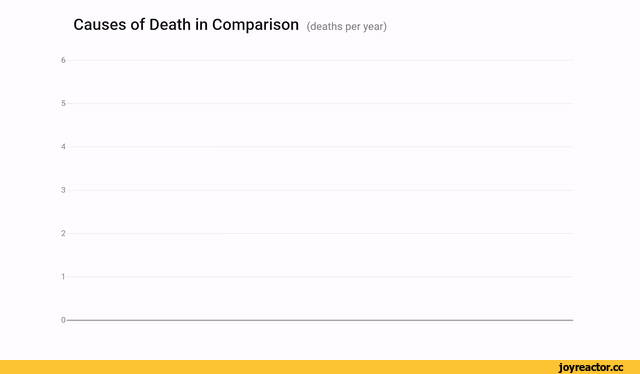Mortality with Meep: Top Causes of Death - Raw Numbers
by meep
An animation of causes of death has been going around the internet this past week.

Originally, I asked myself “Is this just the U.S. or the whole world or what?”
When it got to a very specific cause of death, I knew it was worldwide.
(hippos)
(ok, fine, it was tigers)
I have no idea where that data comes from (I see the URL underlying has Cyrillic characters, but…), but it looks plausible to me, though the categorization is odd. (yes, I’m still waiting for a particular mortality study to get released from the Society of Actuaries… these things move slowly.)
So cardiovascular causes far outweighs pretty much everything else, the world around. Cancer has been gaining over time — mainly because cardiovascular causes have been beaten back… more from improved drugs and more effective surgeries. It’s not because people have had much healthier lives (other than reduction in smoking, which did also help, but not enough to fully explain recent improvements.)
TOP CAUSES OF DEATH IN THE U.S.
Today, I’m looking only at absolute numbers of deaths, not rates (we’ll get to that in a later post).
From the CDC, here’s a chart of the top causes of death in 2017:

I do wonder about some of the stuff in these charts. In particular, how the hell do “benign” neoplasms kill? What the hell, guys. (Neoplasms, of course, are cancer.)
Something you also need to know: “unintentional injury” covers a lot of causes of death. It includes accidental drug overdoses, for example. And car accidents. And falling down and breaking a hip. It’s unsurprising that it’s the only cause that shows up for every age category.
Also, we’re just doing raw counts – there are differing numbers of people in the age categories to begin with, so you have different “exposure bases”. For example — the age 65+ group is HYUUUUUGE.

Okay, the age 55-64 group is also HYUUGE because boomers, but we’ll move on for now.
MISLEADING ASPECT OF TOP TEN CAUSES
Here are the number of deaths for the top ten causes for each age group, graphed:

So, here’s the problem with the above — the totals for each group are just deaths from top ten causes. Some of the cause categories are pretty broad (unintentional injuries).
I looked up the actual total of deaths for 2017… and just including the top ten causes for the entire population undershoots — it covers only 74% of all deaths.
Now, the top ten differs by age group, but even so, only 78% of deaths are covered by the numbers we see… and most of the ones missing are for older folks. Because SO MANY MORE OF THEM DIE. (also, those numbers aren’t accurate because I imputed a count for a specific cause)
Let’s do a pair of weird graphs: number of deaths due to top cause for that age group:

And here’s the number of deaths due to the tenth top cause for that age group:

The main thing to note is that, even with differing scales, you get pretty much the same pattern for each of these slices. It’s not accidental.
But the next thing we look at will be.
UNINTENTIONAL INJURIES
The one top ten cause of death that shows up for every age group, including infants, is unintentional injury.
It is the top cause of death for Americans age 1 – 44. (Then you have the “cancer band” of age 45 – 64, and then cardiovascular for 65+).
For Americans of all ages, it’s the number 3 cause, behind heart disease and cancer.
Let’s look at the pattern.

Very different from the earlier graphs in pattern — but again, it’s a mixture of what I would see as different drivers. For age 15-24, for example – that’s the dumbass period. But really, there is so much in here — car accidents, drowning in pools, getting fentanyl-laced heroin, and granny breaking a hip. The category is too broad, I think.
MALIGNANT NEOPLASMS
Better known as cancer.
It’s not a top killer for all age groups, but it’s only missing for the infant group. And only a few dozen of them die of cancer… they die of other things.

Well, that pattern looks familiar. Perhaps we can posit a common driver when we get a pattern that looks like that.
HEART DISEASE
This is the top killer for the total population, though not the top killer until you get to age 65+.
That wasn’t always true, by the way. Cancer tops heart disease for ages under 65 because, unfortunately, cancer-related mortality has improved at a much slower rate than heart disease.

Yup, it’s the natural shape… gets a bit boring, eh?
Let’s finish it off with two trends that are most definitely not in the standard shape.
SUICIDE
For these last two, because of the nature of the data from top ten lists, I’ve had to “impute” values. This is noting that suicide doesn’t show up as a top cause for those age 65+ (because so many more things are killing people that age) and homicide doesn’t show as a top cause for ages 55+. (I’m not considering children in here, because it amounts to a handful in all these cases.)
Here’s the graph for suicide:

Yeah, those are some hard numbers. The issue here is that there are very different profiles for men & women by age for suicide. Women peak in rates in their middle age, and it just keeps climbing for men. Prior post on that pattern.
HOMICIDE
This one is tougher, because it’s not a top ten cause for the population mortality overall, though it is very high for younger ages.
So I adjusted.

Violent crimes, in raw numbers, are primarily done by young men… and suffered by young men. When looked on at a rate basis, it’s even more obvious.
COMPARISONS OF LEVELS
Let me do a comparison of Homicide v. Suicide. Because I want to make a point.

Yes, for extremely young kids, homicide is more likely than suicide. But pretty for much older ages, suicides far outnumber homicides.
But hey, let me throw in three other major causes of death.

So I’m going leave it to the reader to think about these patterns … and why certain causes get covered in the news…
….and certain do not.
Related Posts
Mortality Nuggets: Videos on Suicide Rate Trends, Society of Actuaries Report, and Fixing Their Graph
Mortality Monday: Supreme Court Probabilities
Good Friday: St. Matthew Passion and Data Update
